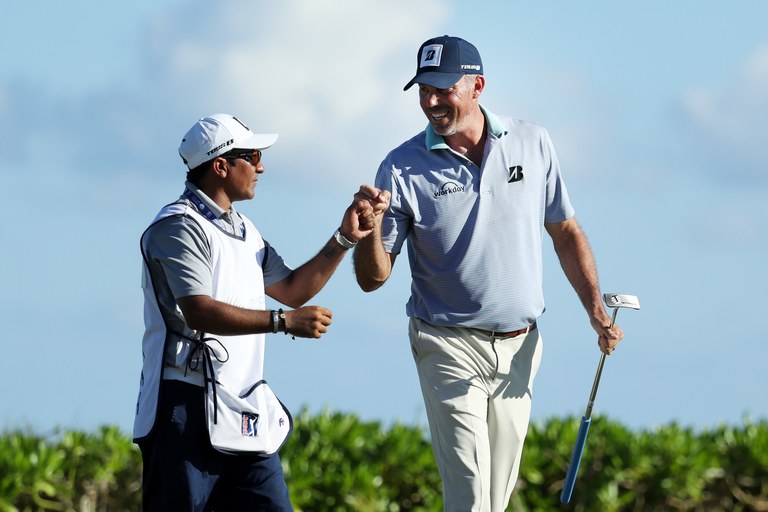Matt Kuchar, social media, and stories that take on lives of their own
.jpg)
att Kuchar leaves Hawaii a winner, but not entirely unscathed.
That’s the prevailing sentiment from a sect of golf observers, the byproduct of an accusation by a former PGA Tour player on Saturday afternoon. The match was lit at 5:08 p.m. ET; by 10, Kuchar, a beloved and venerated personality by American crowds, had come on the business end of a Twitter roasting . . . over how much he paid a fill-in caddie.
Five hours is all it took. Five hours in which Kuchar was on the golf course, oblivious to the drubbing.
“It’s not a story,” Kuchar would eventually say. This statement was aimed at the rumors; time will tell if he’s proven right. Through another prism, Kuchar is already wrong. Because stories like this are a reckoning more and more athletes are forced to confront.
The past decade has shown that realities can come to life through social media. There are arguments for the virtues and vices of digital platforms, but there’s no debate over their capability. Facebook and Twitter have helped overthrow tyrannical regimes, brought improper behavior to light, given the oppressed a voice. Tangible paragons of speaking truth to power.
There’s an upshot, however. The mob mentality often found on Twitter and Facebook can go unchecked, taking on lives of their own. The forums are so emotionally driven that narratives can reach a fever pitch without consideration of context or facts, and the appetite for “owning” someone overtakes the crusade that’s supposed to be fought.
For Kuchar, this materialized at the hands of Tom Gillis of the PGA Tour Champions. In a series of tweets, the 50-year-old Gillis claimed that Kuchar had stiffed David “El Tucan” Ortiz—the local caddie Kuchar had on the bag for his victory in Mayakoba—something fierce.
Now, while the list of athletes indiscretions is long, being tightfisted spurs a special kind of fury. Ours is a culture that implores the rich to spread the love; those failing are branded. Michael Jordan, Scottie (“No Tippin”) Pippen, Pete Sampras and, yes, Tiger Woods are some of the alleged stars with alligator arms.
Kuchar’s case, however, felt different, for it wasn’t a tip as it was wages owed. The optics alone—a veteran with $46 million in career earnings low-balling a man who makes less than $46,000 a year—were damning. That Gillis’ previous blast of Ben Crane over an unpaid bet to Daniel Berger proved accurate wasn’t helping, nor was Australian pro Cameron Percy’s reply of, “It’s not out of character if true.” Several popular media personalities stoked the fervor with their Kuchar stories. The only notable name to defend Kuch was Golf Channel analyst Brandel Chamblee, and he was promptly “ratioed”—the phantasm to describe the overwhelming amount of negative reaction to a tweet—in kind.
This outcry is predictable, and if Gillis is right, understandable. Save for one problem: neither Kuchar nor Ortiz had publicly spoken on the issue.

Golf Digest’s Brian Wacker was among a handful of journalists to approach Kuchar after the Sony Open’s third round about the Twitter rumors. This occurred around 11 p.m. ET, six hours after Gillis posted his claim. Kuchar was emphatic in denying the allegations (also worth noting when Gillis was asked how he got his information, he was light on specifics).
“That’s not a story. It wasn’t 10 percent, it wasn’t $3,000. It’s not a story,” Kuchar told reporters. Kuchar later approached Wacker in the media center saying, “We had an agreement to start the week. He was excited to go to work that week.” His remarks did nothing to stop the drama.
For what it’s worth, Ortiz told Golf.com after the Mayakoba win he had not received or discussed his pay with Kuchar, only that he was aware of the standard 10 percent. (At the time of writing, Golf Digest’s attempts to reach Ortiz through the Mayakoba Resort were unsuccessful). What’s not as clear is Kuchar’s first point: does this constitute a story?
To be clear, scuttlebutt on athletes’ lives on and off the field is nothing new. Drug use, gambling, affairs, sexual orientation; the biggest sports figures have been subjected to it all. What has shifted, though, is where those questions are coming from.
The problem with narratives that emerge on social media is athletes have two options: response or silence. Neither is particularly desired. As Kuchar showed, a response never quiets the whispers, and silence only makes them grow louder.
Kuchar is not alone. Last June, Jimmy Walker self-professed to backstopping, the practice of purposely not marking a golf ball in order to give an opponent a potential advantage. It served as an archetype of the pluses and perils of mob mentality. Good in that it raised a dialogue, receiving the attention and engagement of a marquee name, providing an opportunity for discourse. Bad in that the conversation was less than civil, as Walker—who was forthright and level-headed about the manner—was roasted for admitting to doing something almost everyone does.
“I was just trying to shed some light on how it actually happens out here,” Walker said at the U.S. Open. He was guilty before charges were brought.
Fans aren’t the only ones starting a fire. Tour pro Joel Dahmen took to Twitter after the Quicken Loans National to accuse Sung Kang of cheating. In 2017 then-rookie Grayson Murray called out Bryson DeChambeau for an injury withdraw at Riviera. Former major champ Steve Elkington aired some less-than-flattering remarks toward Rory McIlroy, and the Ulsterman did not take the shot lying down. Danny Willett’s 2016 Ryder Cup was ruined by online remarks from his brother.
There are nuances to each, but those nuances are often lost in the commotion. A shame, as they contain truths. In defense of Kuchar, Chamblee made a handful of valid points. Alas, judging by the responses, they were points that fell on deaf ears. Chamblee wasn’t so much scolded for the contention, but for the sheer audacity to go against the predominant sentiment. To counter, at least on social media, is to quarrel.
The fallout is real. Despite the tour releasing a statement that backed him up, Kang is forever marked as a cheat. The attention sparked by his bout with Elkington caused McIlroy, one of the more cerebral, candid voices in golf, to quit Twitter. “I don’t need to read it. It’s stuff that shouldn’t get to you and sometimes it does,” he said.

At least the above examples were related to competition. In the fall, an Instagram user noticed Dustin Johnson’s fiancee Paulina Gretzky had deleted Johnson’s photos from her social media accounts. Conjecture quickly spread about the status of their relationship, the gossip manifesting in the worst kind of tabloid speculation. The noise became so loud Johnson had to issue a statement. “Every relationship goes through its ups and downs, but most importantly, we love each other very much and are committed to being a family,” Johnson said. “Thank you for your love and support.”
Johnson and Gretzky have not been shy about their relationship. They are also not foreign to controversy, which fueled the gossip. But even the most public of figures warrant privacy, and more than a few observers asked, “What does this have to do with golf?”
Of course, all public figures are subjected to a heightened level of scrutiny, and sometimes it serves a real purpose. Good can come of a herd mentality, as witnessed by the movements against harassment and assault. And if Ortiz really was shorted, he likely has a better chance at getting what’s his thanks to Gillis.
But the pack can be so consumed by righting a wrong that, at times, it fails to ask where the wrong really lies…or if a wrong has even been had.
On Sunday the Golf Channel made a brief mention of Kuchar’s Twitter drama. On social media, some saw it as rubbish, the tour and its partner putting their heads in the sand to a story that had become bigger than the tournament. Conversely, as bad as Kuchar looks at the moment, we still don’t have definitive proof that the story is legitimate. A mere one-off by the broadcast would have given Gillis’ accusation more merit and steam. Once that train leaves the station, there’s no turning around.
So you give Kuchar the benefit of the doubt. Even if that doubt is raised.
These are awkward times, where suspicion and truth are blurred. But it’s the new reality.
[“source=golfdigest”]




